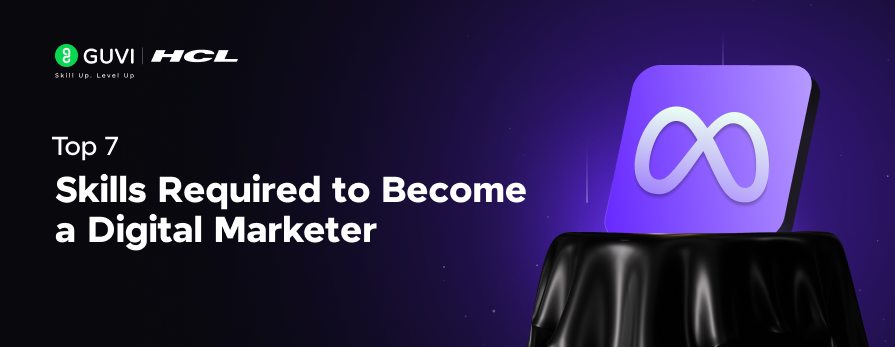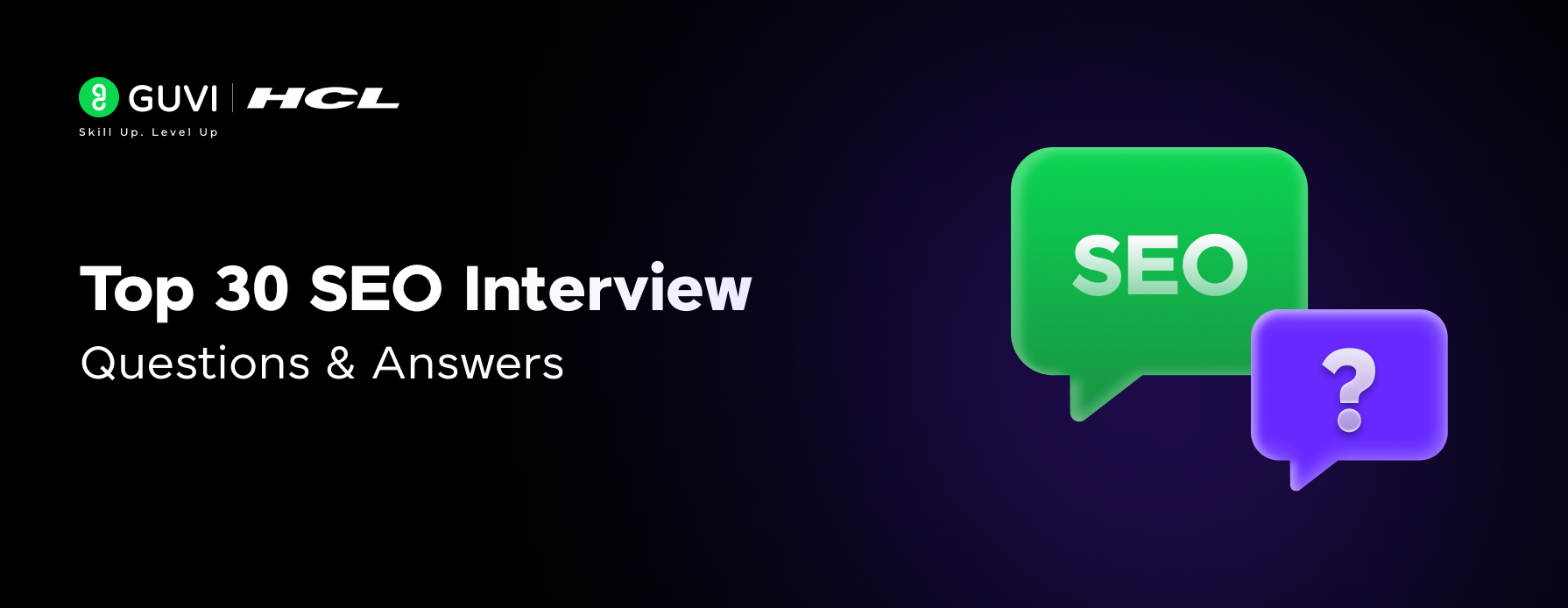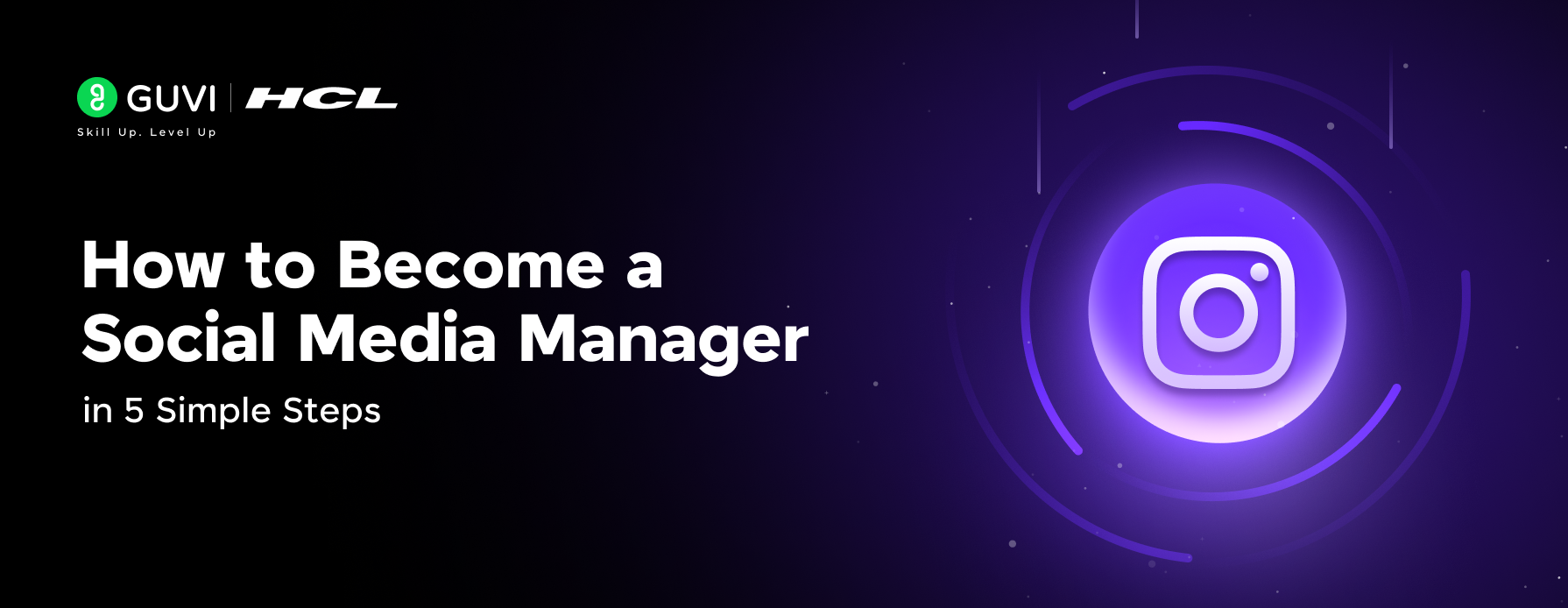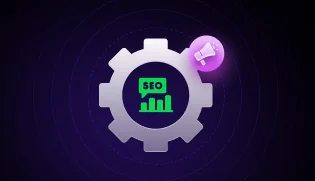
What is SEO? A Comprehensive 2025 Guide
Apr 15, 2025 8 Min Read 4583 Views
(Last Updated)
Your business website’s success depends on search engine visibility. Search engine optimization makes your website easier to find when potential customers look for your products or services online. This applies to both small business websites and large e-commerce platforms.
The world of SEO might seem overwhelming at first. I have created this complete guide to help you understand what is SEO, its workings, and its importance in 2025.
You’ll discover different types of SEO, core techniques, essential tools, and career opportunities in this field. Our beginner-friendly guide simplifies complex concepts into clear steps that you can implement right away.
Table of contents
- What is SEO?
- Why SEO matters
- SEO vs paid search advertising
- Understanding How SEO Works
- Types of SEO
- Technical SEO
- On-page SEO
- Off-page SEO
- Factors Enhancing and Affecting SEO
- Factors Enhancing SEO
- Factors Affecting SEO Negatively
- Core SEO Skills
- SEO Best Practices
- Conduct Thorough Keyword Research
- Optimize On-Page Elements
- Create High-Quality Content
- Enhance Mobile Friendliness
- Improve Site Speed
- SEO Roles and Salaries
- Concluding Thoughts…
- FAQs
- Q1. What is SEO and why is it important for businesses in 2025?
- Q2. How long does it take to see results from SEO efforts?
- Q3. What are the main types of SEO?
- Q4. What are some essential SEO tools for beginners?
- Q5. How much can I earn as an SEO professional in India?
What is SEO?
Search Engine Optimization (SEO) helps search engines understand your content and connects it with users looking for information about your business. It optimizes your website to get traffic from search engine’s organic (unpaid) rankings.

Google should see your pages just like an average user does. Your content needs to be easy to find and relevant to people’s searches. Google uses automated programs called crawlers that constantly explore the web to add pages to their index.
Why SEO matters
Organic search brings 53% of all website traffic, making SEO crucial and hence it is quintessential to understand what is SEO. On top of that, Google Search handles over 8.5 billion searches daily and controls 91% of the global search engine market. The SEO industry will likely reach USD 122.11 billion by 2028.
Here are the key benefits of implementing SEO:
- Creates lasting long-term results
- Builds trust and credibility with your audience
- Gives better returns than traditional advertising
- Gets more traffic to your website naturally
SEO vs paid search advertising
SEO and paid search both boost visibility in search results but work differently. Organic search results show up under paid ads and rank based on hundreds of factors. Research shows that organic search drives 53% of site traffic while paid search brings 15%.
The investment approach sets them apart. Paid search delivers quick results but costs money per click. SEO takes time but becomes budget-friendly over time. Organic listings build trust because users know they aren’t paid ads.
Understanding How SEO Works
Search engines function like vast digital libraries that scan and catalog billions of web pages. Picture Google’s crawlers as librarians who explore the internet methodically to find and organize content.

The automated ranking systems analyze billions of web pages in Google’s Search index and show the most relevant results within seconds. The process works through three main steps:
- Crawling: Google’s automated programs (called spiders) explore web pages through links
- Indexing: Pages found are added to Google’s master database
- Ranking: Complex algorithms determine which pages appear for specific searches
Search engines examine several signals to determine page rankings, especially:
- Content relevance and quality
- Site structure and technical setup
- User experience factors
- External signals like backlinks
Google’s systems focus on understanding what users mean in their search queries. The systems analyze content to check if it matches what users want to find. Modern search algorithms go beyond keyword matching and assess context and user intent.
Your content’s quality plays a vital role in rankings. Google’s systems want to spot signals that show expertise, authority, and trustworthiness. There’s another reason why other prominent websites linking to your content matter – it shows trustworthiness.
Technical elements shape your rankings too. Search engines look at mobile-friendliness, loading speed, and secure connections (HTTPS) to determine page rankings. These features affect how users access and interact with your content.
Search engines measure and assess their systems’ quality constantly. They use total feedback from their evaluation process to improve how their systems determine information relevance and authority. This approach keeps search results helpful and accurate for users.
Types of SEO
You need to understand three main types of SEO to make your optimization strategy work. Each type has a unique role in making your website more visible and improving its ranking in search results.

Technical SEO
Technical SEO makes your website’s infrastructure better so search engines can crawl and index your site quickly. This forms the foundation of your SEO strategy by ensuring:
- Site speed optimization
- Mobile-friendliness
- Secure website (HTTPS)
- Proper site structure
- Structured data implementation
Technical SEO is a vital component because mobile devices generate more than half of all web traffic. A website that loads fast and stays secure protects user information and builds trust with visitors and search engines.
On-page SEO
On-page SEO makes the elements within your website pages better to improve their visibility in search results. We focused on making content more user-friendly and relevant to your target audience’s searches.
Understanding and matching search intent are the foundations of on-page SEO. Your content should be original, informative, and engaging while it answers specific questions from your target audience. Title tags and meta descriptions are key HTML elements that can affect your website’s click-through rate from search results by a lot.
Off-page SEO
Off-page SEO covers all activities done outside your website to boost its authority and visibility. These efforts show search engines how trustworthy and reputable your site is.
Off-page SEO activities aim to improve your site’s:
- Expertise
- Experience
- Authoritativeness
- Trustworthiness
- Relevance
- Popularity
All the same, these three types of SEO complement rather than compete with each other. They work together to create a detailed SEO strategy. The best results come when you first improve technical elements, focus on on-page efforts, and develop your off-page SEO strategy.
Factors Enhancing and Affecting SEO
Your search rankings depend on many factors. Google uses over 200 ranking signals to decide where your website shows up in search results.
Several factors contribute to SEO success, while others can hinder its effectiveness. Let’s explore these factors in detail:
Factors Enhancing SEO

1) Quality Content
High-quality, original content is the cornerstone of effective SEO. Content that is engaging, informative, and tailored to user intent helps improve rankings and builds trust with the audience. Incorporating relevant keywords naturally within the content ensures it aligns with search queries, increasing the chances of being discovered by search engines. Additionally, consistently updating content keeps it fresh and relevant.
2) On-Page Optimization
On-page optimization involves fine-tuning website elements to improve visibility. Proper use of title tags, meta descriptions, and header tags (H1, H2, H3) ensures search engines can interpret the page’s structure and relevance. Keyword-rich URLs and internal linking improve navigation and signal content relationships to search engines, enhancing rankings.
3) Mobile-Friendliness
With the majority of users accessing websites through mobile devices, a mobile-friendly design is essential. Responsive designs adjust seamlessly to various screen sizes, providing a smooth user experience. Search engines prioritize mobile-optimized websites in their rankings, making this a critical factor for modern SEO strategies.
4) Page Speed
Fast-loading websites are favored by both users and search engines. Delays in page loading can lead to high bounce rates, negatively impacting rankings. Techniques such as image compression, browser caching, and minimizing code can improve page speed, ensuring users stay engaged and search engines rank the site higher.
5) Backlinks
Backlinks act as endorsements from other websites, signaling credibility and authority. High-quality backlinks from reputable and relevant sites significantly boost rankings. However, link-building strategies should focus on organic growth rather than manipulative tactics to avoid penalties from search engines.
6) User Experience (UX)
A seamless user experience is vital for retaining visitors and encouraging engagement. Websites with intuitive navigation, visually appealing layouts, and minimal intrusive elements like pop-ups provide value to users. Search engines reward sites with lower bounce rates and longer dwell times, viewing them as more relevant to users.
7) Local SEO
For businesses targeting local audiences, optimizing for local SEO is critical. This includes using location-specific keywords, creating a Google My Business profile, and ensuring consistent Name, Address, and Phone number (NAP) information across all platforms. These practices improve visibility in local searches and enhance customer trust.
Factors Affecting SEO Negatively

1) Duplicate Content
Search engines penalize websites with duplicate or plagiarized content, as it diminishes credibility and offers no unique value to users. Ensuring original content across all pages is essential to maintain a positive reputation and avoid ranking drops.
2) Keyword Stuffing
Overloading content with excessive keywords can disrupt readability and lead to penalties. Modern search algorithms prioritize user-friendly content, so keywords must be used naturally and strategically to align with the intent without compromising quality.
3) Poor Backlinks
While backlinks are valuable, those from irrelevant or low-quality sites can harm your website’s reputation. Search engines associate spammy backlinks with manipulative tactics, which can result in penalties. Focus on earning links from authoritative and relevant domains.
4) Lack of HTTPS
Websites without an SSL certificate (HTTPS) are considered insecure by search engines and users alike. HTTPS not only secures user data but also serves as a ranking factor. Investing in SSL certification enhances trust and SEO performance.
5) Technical Issues
Technical problems like broken links, missing alt text for images, and poor site architecture can negatively impact SEO. Such issues hinder search engine crawlers from indexing your website effectively and degrade the user experience, leading to lower rankings.
6) Overuse of Ads
Websites cluttered with ads, especially those that interfere with content consumption, frustrate users, and increase bounce rates. A balance between monetization and user experience is necessary to maintain engagement and ensure better rankings.
7) Neglecting Analytics
Failing to track and analyze website performance can stall SEO efforts. Regularly monitoring metrics like organic traffic, bounce rates, and keyword rankings helps identify areas for improvement. Without data-driven adjustments, SEO strategies risk becoming outdated.
A strong SEO strategy requires balancing factors that enhance visibility and addressing those that negatively affect performance. By focusing on quality content, user experience, technical soundness, and staying updated with search engine guidelines, businesses can ensure sustained growth and success in the competitive digital landscape.
Master SEO and other essential digital marketing strategies with GUVI’s Advanced Digital Marketing Course. Designed for beginners and professionals alike, this course offers hands-on training, expert mentorship, and real-world projects to help you dominate search engines in 2025 and beyond. Learn at your own pace and elevate your career in digital marketing!
Core SEO Skills
Becoming skilled at search engine optimization needs both technical expertise and soft skills. We need strong analytical abilities and creative problem-solving skills for SEO success.

These skills include:
| Skill | Description | Key Tools/Techniques | Why It’s Important |
| Keyword Research | Optimizing meta tags, keyword placement, internal linking, and alt text for images | Google Keyword Planner, Ahrefs, SEMrush, Ubersuggest | Drives traffic by ensuring content aligns with what users are searching for. |
| On-Page Optimization | Optimizing page elements like meta tags, headers, and content to align with SEO best practices. | Optimizing meta tags, keyword placement, internal linking, alt text for images | Enhances user experience and ensures pages are easily understood by search engines. |
| Technical SEO | Ensuring a website is crawlable and indexable by search engines while resolving technical issues. | XML sitemaps, robots.txt, canonical tags, schema markup, Core Web Vitals analysis | Essential for search engines to access, interpret, and rank a site effectively. |
| Content Creation & Optimization | Creating engaging, keyword-rich, and user-focused content while maintaining readability and SEO best practices. | LSI keywords, optimized headlines, subheadings, bullet points, readability scores | Drives user engagement and search engine ranking by delivering high-quality, relevant content. |
| Link Building | Acquiring backlinks from authoritative and relevant sites to boost credibility and domain authority. | Guest blogging, outreach campaigns, competitor backlink analysis, Moz Link Explorer | Improves site authority and search engine trust, which are key ranking factors. |
| Analytics & Reporting | Tracking and analyzing SEO performance to make data-driven decisions for optimization. | Google Analytics, Google Search Console, Data Studio, Ahrefs | Provides actionable insights to refine strategies and measure ROI. |
| Competitor Analysis | Evaluating competitors’ SEO strategies, including keywords, backlinks, and content performance. | SEMrush, Ahrefs, SimilarWeb | Helps identify gaps and opportunities in SEO strategy to outperform competitors. |
| Local SEO Skills | Optimizing for local searches, including managing GMB listings and ensuring consistency in business details across directories. | Google My Business, BrightLocal, Yext | Vital for businesses targeting local customers and improving visibility in “near me” searches. |
| Search Algorithm Knowledge | Understanding updates and ranking factors from search engines to stay compliant and competitive. | Core Web Vitals, E-E-A-T principles, monitoring algorithm changes (e.g., Penguin, Panda, Helpful Content Update) | Keeps strategies aligned with the latest search engine requirements to avoid penalties. |
| Adaptability & Problem-Solving | Quickly adjusting strategies to respond to industry changes, algorithm updates, and competitive shifts. | Scenario analysis, issue diagnosis using tools like Screaming Frog, structured troubleshooting | Essential in a constantly evolving digital marketing landscape. |
SEO Best Practices
A systematic approach that works with current search engine algorithms makes SEO practices work better. Your website can succeed in 2025’s competitive digital world by following these proven best practices.

1. Conduct Thorough Keyword Research
Keyword research is the foundation of any successful SEO strategy. Use tools like Google Keyword Planner, Ahrefs, or SEMrush to find keywords relevant to your niche and audience.
Focus on long-tail keywords as they often have less competition and better reflect user intent and analyze competitor keywords to identify opportunities and gaps.
Group related keywords together to target them effectively in your content and continuously refine your keyword strategy based on performance metrics.
2. Optimize On-Page Elements
On-page optimization involves fine-tuning individual web pages to rank higher and earn more relevant traffic.
- Title Tags: Craft unique and compelling titles for each page, incorporating primary keywords naturally and keeping them under 60 characters.
- Meta Descriptions: Write engaging meta descriptions (up to 155 characters) that include target keywords and provide a clear summary of the page content.
- Headers (H1, H2, H3): Organize content with descriptive headers to improve readability and integrate secondary keywords.
- URL Structure: Create concise, descriptive URLs with keywords to improve search engine and user understanding.
- Internal Linking: Link to relevant pages within your site to distribute link equity and help users navigate seamlessly.
3. Create High-Quality Content
Content is king when it comes to SEO. Develop in-depth, original content that addresses the needs and questions of your target audience. Use a clear and engaging writing style that keeps readers interested.
Also include multimedia elements like images, videos, and infographics to enhance the content’s appeal. Research thoroughly to ensure factual accuracy and build authority. Make sure to update and repurpose older content to keep it fresh and relevant.
4. Enhance Mobile Friendliness
With mobile devices accounting for the majority of web traffic, mobile optimization is crucial. You must implement responsive design to ensure your site adapts seamlessly to any screen size. Test your site’s mobile usability using Google’s Mobile-Friendly Test and address any issues.
Optimize navigation menus for touch interaction, making them easy to use on smaller screens, and prioritize fast loading speeds for mobile users by optimizing images and enabling browser caching. Ensure clickable elements, like buttons and links, are properly spaced and easy to tap.
5. Improve Site Speed
Site speed is a key ranking factor that impacts both user experience and SEO performance. You should compress images using tools like TinyPNG or ImageOptim to reduce file sizes without sacrificing quality and minimize the use of heavy scripts and enable asynchronous loading for JavaScript.
Leverage browser caching to store frequently used resources locally on users’ devices. Also, make sure to use a Content Delivery Network (CDN) to deliver content faster by using servers located closer to the user. Regularly audit your site’s speed with tools like Google PageSpeed Insights and GTmetrix to identify and resolve bottlenecks.
Keeping up with SEO trends and algorithm changes helps you succeed. This watchfulness lets you adapt as search engines evolve. Regular content audits ensure your pages stay relevant and valuable to your audience.
Your metadata needs careful optimization. Compelling page descriptions encourage users to visit your website. These elements affect your search visibility and click-through rates even though users can’t see them directly on your pages.
SEO Roles and Salaries
SEO jobs in India offer rewarding career paths with opportunities at every level. The job market shows promising growth, and professionals can find positions in major cities.
Entry-Level Positions Your SEO experience starts as a trainee or fresher, with annual earnings between ₹2.5-4 lakhs. You’ll learn the basics and help senior team members with their daily work.
| Role | Experience | Average Monthly Salary (₹) | Description |
| SEO Intern | 0-1 year | ₹10,000 – ₹20,000 | Entry-level position focusing on keyword research, content optimization, and learning SEO tools. |
| Junior SEO Analyst | 1-2 years | ₹20,000 – ₹35,000 | Handles basic technical SEO, on-page optimization, and link-building efforts. |
| SEO Analyst | 2-4 years | ₹35,000 – ₹55,000 | Manages detailed technical audits, competitor analysis, and advanced keyword strategies. |
| SEO Specialist | 3-5 years | ₹50,000 – ₹80,000 | Leads campaign planning, analytics tracking, and strategy implementation. |
| SEO Manager | 5-8 years | ₹80,000 – ₹1,50,000 | Oversees the SEO team, aligns strategies with business goals, and coordinates with other departments. |
| Digital Marketing Manager | 6-10 years | ₹1,00,000 – ₹2,00,000 | Supervises multi-channel campaigns, including SEO, SEM, and social media. |
| SEO Consultant | 5+ years (freelance) | ₹75,000 – ₹2,50,000 (project-based) | Provides strategic SEO insights and expertise to companies on a project or consultancy basis. |
| Head of SEO/SEO Director | 10+ years | ₹2,00,000+ | Develops overarching SEO strategies, manages large teams, and drives enterprise-level outcomes. |
Master SEO with GUVI’s SEO for WordPress Website Course. This beginner-friendly program dives deep into actionable SEO strategies, teaching you to optimize content, improve search rankings, and drive organic traffic. Perfect for those aiming to elevate their online presence, this course ensures your site stands out in competitive digital landscapes.
Concluding Thoughts…
SEO is a vital element for online success in 2025. You should see SEO not as a complex technical challenge but as a simple way to improve your website’s visibility and user experience.
Successful SEO combines three core elements.
You can start with simple fundamentals like proper site structure, engaging content, and basic keyword research to set yourself on the right path.
SEO careers look promising, especially in India. Professionals can advance from entry-level positions to senior roles with attractive salaries.
FAQs
SEO, or Search Engine Optimization, is the process of optimizing websites to improve their visibility in search engine results. It’s crucial for businesses in 2025 because it helps increase organic traffic, builds credibility, and provides a higher return on investment compared to traditional advertising methods.
SEO is a long-term strategy, and results typically take time to manifest. While some improvements may be noticeable within a few months, significant changes in rankings and traffic often take 6-12 months or more, depending on factors like competition and the current state of your website.
There are three main types of SEO: Technical SEO, which focuses on optimizing your website’s infrastructure; On-page SEO, which involves optimizing elements within your website pages; and Off-page SEO, which encompasses activities performed outside your website to boost its authority and visibility.
For beginners, Google Search Console is an excellent free tool to start with. It provides insights into how Google views your website and helps identify areas for improvement. Other useful tools include Ahrefs and SEMrush for comprehensive analysis, and Yoast SEO for WordPress users.
SEO salaries in India vary based on experience and location. Entry-level positions typically offer ₹2.5-4 lakhs per annum, while experienced SEO specialists can earn between ₹4-8 lakhs annually. Senior roles like SEO managers or directors can command salaries ranging from ₹7-18 lakhs or even higher in some cases.

























![How to Switch from Sales to Digital Marketing: A Beginner's Guide [2025] 14 sales to digital marketing](https://www.guvi.in/blog/wp-content/uploads/2025/01/How-to-switch-your-career-from-Sales-to-Digital-Marketing.png)




Did you enjoy this article?